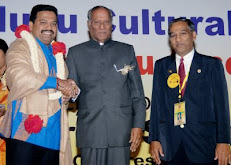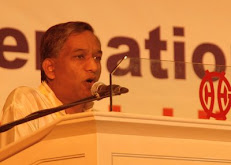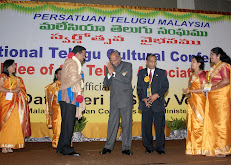Handwritten Sanskrit-Telugu dictionary digitised M. Malleswara Rao
| Handwritten by litterateur P. Rangacharyulu over a century ago |
Digitisation completed by the A.P. Oriental Manuscripts Library & Research Institute
Rangacharyulu's descendants not only gave the manuscripts but also donated liberally
HYDERABAD: A rare Sanskrit dictionary (Sanskrit to Telugu), hand-written in Telugu script on over 4 lakh pages of manuscript paper single-handedly by Paravasthu Rangacharyulu more than a century ago, has at last been digitised and preserved for posterity in the form of CDs.
The task was completed by the Andhra Pradesh Oriental Manuscripts Library & Research Institute (APOMLRI) with the help of Iran under a project taken up to protect all the 24,000-odd manuscripts in Telugu, Sanskrit, Urdu, Persian etc. it procured, for future generations.
The Noor Microfilm Centre, Delhi, an agency possessing expertise in converting ancient manuscripts into soft copies, which is funded by Iran, made this stupendous task possible.
Website
The digitised dictionary has since been placed on website http//:manuscriptslibrary.ap.nic.in to meet the needs of researchers and scholars all over the world.
The APOMLRI secured these manuscripts, which throw light on some unknown aspects of history and heritage of this part of the globe, from the descendants of the original authors or through various other sources under the National Mission for Manuscripts launched by the government of India, and before.
Paravasthu Rangacharyulu (1822-1900) lived in what is now East Godavari district. His massive work could be digitised as descendants of his family had not only surrendered the manuscripts to the APOMLRI but also offered a munificent donation.
Another Paravasthu
Incidentally, the first grammar book of Telugu language “Balavyakaranam” also came from another litterateur from the “Paravasthu” tree, Paravasthu Chinnayasuri, whose ‘Neetichandrika' (Telugu translation of Panchatantram) is too well-known.
Prof. Sipada Subrahmanyam, director, APOMLRI, says his institute has digitised over 18,000 out of the 24,000 manuscripts so far and it will complete the job in case of the remaining ones in six months. The Noor Microfilm Centre is invariably involved in the task. Among the precious manuscripts digitised is an 8th century book in Persian “Tibbemohamood Shahi,” which mentions the medical system proposed by Prophet Mohammed. It is said this book is not available anywhere else in the world. A copy of the Holy Koran written in 1247 AD is another rare possession.
Five catalogues
The APOMLRI has brought out five catalogues, providing details of manuscripts language-wise in an index form. Two of them covered 523 Telugu manuscripts that focus on fine arts such as Yakshaganam, grammar and poetic technique satakam.
Two others, prepared by Nasiruddin Hashmi in 1950, detailed 1,342 Urdu manuscripts dealing with history and language.
One catalogue printed on Sanskrit manuscripts dealt with grammar.










.jpg)
.jpg)
.jpg)
.jpg)
.jpg)

